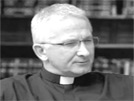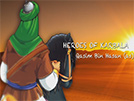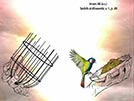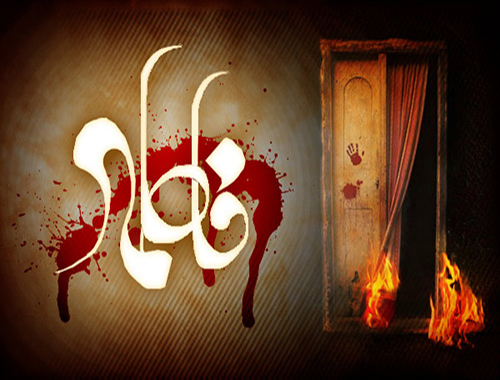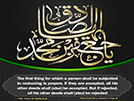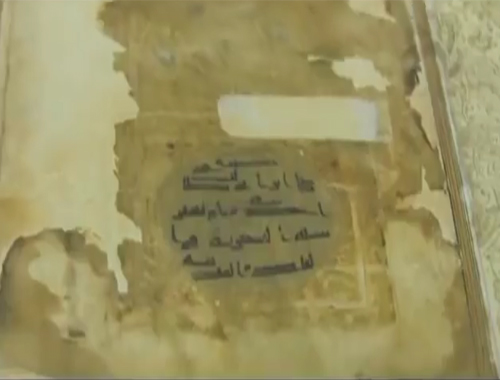Supplement- Regency Document
- Details
- Hits: 24298
Supplement
Regency Document
--------------------------------------------------------------------------------
Historians have often made reference to the regency declaration written for Imam al-Rida (A.S.) by al-Mamoon. Al-Arbili in his Kashf al-Ghumma fi Akhbar al-A'imma may be considered the most reliable of all in his textual accuracy because he stated that he had examined the original copy of the declaration and quoted it word for word, and we would like to quote it here in its narrative. He mentioned in his book the following:
"In the year 670, one of his executives came from his (Imam's) sacred quarters with the document written in person by al-Mamoon, and between its lines and on its back cover there were comments made in the handwriting of the Imam; so I kissed the places where he had written, and let my eyes glide on the gardens of his speech. I considered having come across it as one of the blessings and favours of God, and I copied it down ver batim, and it is handwritten by al-Mamoon who stated:
In the Name of God, Most Gracious, Most Merciful
This is a document written by the commander of the faithful Abdullah son of Harun al-Rashid for Ali ibn Mousa ibn Ja'fer, his heir to the throne:
THEREUPON, God the Exalted and the Sublime has selected Islam as His religion, and chose from among His servants Messengers leading to Him, guiding others towards Him, the first of them tells the glad tidings about their last, the latest among them testifying to the former, till God's Prophethood ended with the Prophethood of Muhammad (S.A.W.) after a long period during which no prophets were sent, while knowledge was obliterated, inspiration ceased, and the Hour drew nearer. So God sealed through him all other Prophets and made him a witness for them, an authority over them, and He revealed unto him His Dear Book which wrong cannot approach from front or from back, a Revelation from the Wise, the Praised One, of what He permitted and prohibited, promised of bliss and forewarned of retribution, warning and alerting, enjoining and prohibiting, so that He would have the clear proof against His creation, `... to annihilate whoever He annihilates with clear evidence, and keep whoever He kept with clear evidence, and God is Hearing, Knowing.'210So he conveyed the Message on His behalf and invited others to His Path according to the Commandment he received, by wisdom, counsel, and by the most beautiful argument, then by jihad and ruthlessness till God took him away to Himself and He preferred for him what He had in store for him, peace of God be upon him and his progeny. So when Prophethood was terminated, and God, through Muhammad (S.A.W.), sealed inspiration and the Message, He made the uprightness of the religion and the order of the Muslims' affairs the responsibility of caliphate and its commencement and dignity, and to uphold God's right by obeying it; through it do God's injunctions and limits are performed and so are the legislation and the Sunnah of Islam, fighting His enemy thereby. The caliphs of God are obligated to obey Him regarding His religion and His servants whom He entrusted to them, and the Muslims are enjoined to obey and assist their caliphs to establish the right and justice of God, to maintain security, avoid bloodshed, join rifts, bring people together to love each other; otherwise, the Muslims will suffer chaos and confusion, their religion will be altered, their creed will be overcome, their enemy will have the upper hand over them, they will be divided with dissensions, and they will lose this world and the world to come.
It became, therefore, incumbent upon those whom God enabled to be caliphs on His earth, and whom He entrusted to fare with His servants, to exert themselves and prefer what pleases God and what brings about obedience to Him, and to hold tight to what God supports them about, for God the Dear and Sublime says to His prophet Dawood (David) (A.S.), `O David! We have made thee a caliph on earth; therefore, judge among people justly and do not follow your own inclination for that would surely cause you to stray from God's Path, and whoever strays from His Path shall have a painful chastisement due to what they forgot,'211 and He also said, `By thy Lord! We shall ask all of them about what they used to do.'212
It has reached us that Umer ibn al-Khattab said, `If a goat was lost on the bank of the river Euphrates, I would be afraid that God would ask me about it.' By God! The person who is responsible particularly for his own conduct regarding his relationship with God is subjected to a great deal of danger and a great responsibility; so, how about the one who is responsible for looking after the entire nation?! In God do we trust; from Him do we seek security, help, protection against erring, support, guidance to prove the argument, and success in achieving His Pleasure and be worthy of His Mercy.
Indeed, the most wise of men, and the best in following God's creed regarding his religion, and God's servants from among those whom He established as His caliphs on His earth, is one who acts according to his obedience of God, following His Book and the Sunnah of His Prophet (S.A.W.) during his lifetime and after his demise, and exerted his mind and insight regarding who he should choose as his heir to the throne and the Imam to the Muslims to look after them after him, installing him as a flagpost for them and a refuge to gather them together round him, settle their disputes, protect their lives, guarantee their security by the Will of God against their dissensions, broken relations, disputes, and to purify them of the whispering of the devil and his scheming, for God the Dear and Sublime has made succession after caliphate a condition for complementing Islam, its perfection, dignity, and the goodness of its people, inspiring His caliphs to make certain that whoever they chose after them would be a great blessing, one who is blessed with perfect health, so that he would render null the scheming of those who sow the seeds of dissension and enmity and try to divide people and make plans for dissension.
Since caliphate was assigned to him, the commander of the faithful experienced the ugliness of its taste, the weight of its burdens, the hardship of its tasks, and the extent of obedience to God and fear of Him by the one who accepts to bear its responsibility; so he exhausted his body, remained awake and prolonged his contemplation upon whatever would bring about the dignity of the creed, the conquering of the polytheists, the good of the nation, the dissemination of justice, the upholding of the Book and the Sunnah, and all of this forbade him from relaxing or resting or enjoying life, knowing that God will hold him accountable for all of these matters, and out of his own love to meet his Lord after having advised them regarding His religion and servants, selecting his heir for the best interest of the nation after him the best person he can choose due to his piety, soundness of belief and knowledge, the most suited among them to carry out God's commandments and His injunctions, pleading the Almighty to help him and inspire to him what brings about His Pleasure and Obedience to Him at night and at day, earnestly pleading and praying, from among his own household the descendants of Abdullah ibn al-Abbas and Ali ibn Abu Talib (A.S.), keenly discerning their condition, belief and knowledge, inquiring about what he did not know regarding them, till he came to know their conditions on a first-hand basis, observing them personally and examining their affairs, questioning them about what he did not know in their own regard.
Having prayed God for guidance in making his decision, exerting himself in carrying out His commandments regarding His servants and lands in both households, he selected Ali ibn Mousa ibn Ja'fer ibn Muhammad ibn Ali ibn al-Husayn ibn Ali in Abu Talib (A.S.) due to his excellent distinction, radiant knowledge, apparent piety, pure asceticism, renunciation of the world, safety from people's criticism. And it became clear to him that narrations still testify to each other and the tongues agree with each other and the opinion regarding him is in consensus, and due to what he personally knows of his distinction as a child, as a young boy, as an adult, and as a grown-up man; therefore, he tied the knot of caliphate for him after himself, feeling confident regarding God's support to him in this regard, for He knows that he did so out of his own preference of Him and His Creed and out of his concern about the well-being of Islam and Muslims, seeking security for all and firmness of the truth and salvation on the Day when people rise up for the meeting of the Lord of the Worlds. The commander of the faithful, therefore, invited his sons and members of his family, his close friends, commanders of his army and those in his service to swear the oath of allegiance which they did quickly and gladly, knowing that the commander of the faithful prefers obedience to God over his own inclination towards preferring his sons or others who are among his kin, and he called him al-Rida (A.S.), for the commander of the faithful is pleased with him; so, the household of the commander of the faithful swore the oath of allegiance to him and so did his commanders and soldiers at Medina and the Muslim masses, to the commander of the faithful and to Ali ibn Mousa al-Rida (A.S.) after him in the Name of God and by His blessings and decree for the good of His creed and His servants, an allegiance to which your hands are stretched and your hearts are pleased, knowing the objective of the commander of the faithful behind it: his preference of obeying God, his and your own interest, thanking God for the share of the commander of the faithful spent in discharging your responsibility and his concern about your guidance and good-will, hoping that its outcome will be your unity, protection, solidarity, the strengthening of your weak spots, the strength of your creed, and the uprightness of your affairs. Hurry, therefore, to the obedience of God and of the commander of the faithful, for the issue regarding which you hurry and because of which you praise God will be for your own good as you will find out by the Will of God.
He wrote it in his own handwriting on Monday, the 23rd of Ramadan, 201 A.H.
The above is a reproduction of what al-Mamoon had written for Imam al-Rida (A.S.), and on the back of it the Imam (A.S.) wrote down the following:
In the Name of God, Most Gracious, Most Merciful
Praise be to God Who does whatever He pleases; there is none to revoke His judgement nor obstruct His Will; He sees what other eyes cannot, and He knows what people conceal in their hearts; His blessings unto His Prophet Muhammad (S.A.W.), the seal of Prophets, and unto his good and Purified Progeny (A.S.).
I, Ali ibn Mousa ibn Ja'fer, state here that the commander of the faithful, may God grant him the strength of staying on the Right Path, has come to recognize of our right what others have neglected to know; so he joined wombs which were separated and brought security to frightened souls; nay, he gave them life after they were annihilated and provided them with wealth after being impoverished, seeking thereby to please the Lord of the World, not expecting a reward from anyone other than Him, and God will reward those who thank Him and will never suffer the toil of doers of good to be wasted.
He has chosen me as his successor, granting me the greatest responsibility if I live after him; therefore, anyone who unties a knot God enjoined to be tied, or removes a joint God enjoined to be kept, has indeed violated the honour and committed haram, for he will then be transgressing upon the Imam, violating the sanctity of Islam. Such was the case in the past, so he remained patient while seeing mistakes committed and did not voice his objection when rights were discarded out of his fear of dissension in the religion and disunity among the Muslim masses, and due to the fact that the days of ignorance (jahiliyya) are not too far behind, and in order not to give opportunists a chance nor to let an innovation invented. I have prayed God to witness to what is on my mind should He place me in charge of dealing with the Muslims and grant me caliphate, that I will deal with them in general and on the descendants of al-Abbas ibn Abdul-Muttalib in particular according to the obedience due to Him and to His Messenger (S.A.W.), and that I do not shed any blood unfairly nor permit honour nor wealth to be violated except the blood shed according to the permission allowed by the establishment of God's limits and obligations, and that I shall choose to the best of my ability officers who are most qualified for their jobs, making that a sure commitment and a promise about which God shall ask me for He, the Exalted and the Almighty, says, "And fulfill the promise, for the promise shall be asked."213
Should I bring an innovation, or alter anything, or replace anything, I would then deserve my penalty and expose myself to retribution; I seek refuge with God against His Wrath, and from Him I seek success in obeying His Commandments and not to enable me to disobey Him, all for the sake of the safety of myself and of all the Muslims; "And I do not know what will be done with me or with you;"214 "The command rests solely with God; He decides in truth, and He is the best of judges."215 But I obeyed the will of the commander of the faithful and preferred his pleasure, and may God protect him and myself from erring, and I seek His witness over myself about this matter, and He suffices for Witness. I have written this in my own handwriting in the presence of the commander of the faithful, may God prolong his presence, and in the company of al-Fadl ibn Sahl, Sahl ibn al-Fadl, Yahya ibn al-Aktham, Abdullah ibn Tahir, Thumama ibn Ashras, Bishr ibn al-Mu'tamid, and Hammad ibn al-Nu'man, in the month of Ramadan, in the year two hundred and one.
On the right side of the document, the following witnesses have signed: Yahya ibn Aktham who testifies to both the front and the back of the document and he asks God to enable the commander of the faithful and all the Muslims to appreciate the blessing of this testimony and testament; Abdullah ibn Tahir ibn al-Husayn has written down his name and the same date; Hammad ibn Nu'man has written in his own handwriting and has testified to its front and back on that date; and Bishr ibn al-Mu'tamid has testified to the same.
On the left side of the document, the following writing is inscribed: "The commander of the faithful, may God prolong his presence, has handwritten this script which is the document of covenant whereby we anticipate goodness in both its front and back, (written) at the shrine of our master the Messenger of God (S.A.W.), between the rawda (courtyard) and the minbar (pulpit), in the presence of all the witnesses, and while the dignitaries of Banu Hashim and all friends and members of the army who met the qualifications of making such a bay'a (allegiance), in order to nullify any doubt cast by the ignorant, for `God will not leave the believers in the state in which ye are now...'216 Al-Fadl ibn Sahl, in obedience to the orders of the commander of the faithful, has written this on the same date."
--------------------------------------------------------------------------------
210 Al Anfal:42
211 Saad:26
212 Al Hijr (The Rocky Tract):92-93
213 Bani Israil:34
214 Al Ahqaf:9
215 Al An'am:57
216 Aali 'Imran:179


